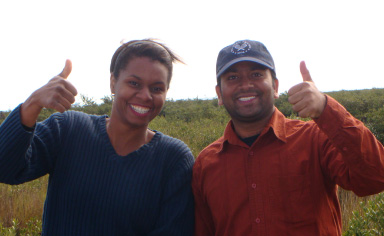In Dr. Crystal Johnson's experience, having students in her lab means communicating about her work in ways that are different from
talking with other scientists. And she finds this very beneficial: it helps frame her own communicating about her research. It helps
her define why her research is important, helps define why anyone should care about scientific progress, making it clearer to both
tax payers and funders. "One of the things I hear from reviewers about my grant proposals is they can actually understand them," she
says.
She also gets extra pairs of hands to get the work gets done faster, meaning side projects get going that would not have gotten off the
ground otherwise. And the students' excitement is contagious.
On the other hand, there is the expense of lab equipment breakage, and the frustration of never getting credit. "I have to treat
outreach as a hobby, have to love it. It's frustrating when it's frowned on or I get asked why do you do it."
Crystal's consistent commitment to outreach makes her accessible, and helps her to feel more human. "I'm a regular person who has
faults and who makes jokes," she says. "We're not all serious all the time, but we do do serious science." Crystal finds outreach
balances the seriousness of science, the deadlines and reports and manuscripts, the administrative rigidness. It's a balancing act.
"It broadens your own horizons and makes you more adaptable. I am not above being told I made a mistake or being taught by the
students. That's a huge benefit."




